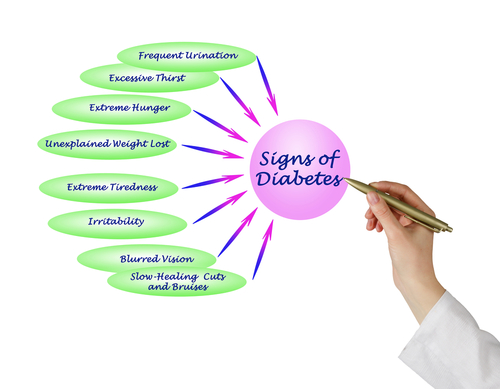As an adult, diabetes is something that can creep up on you without any warning. Well, that’s not quite true — there are definite warning signs for adult-onset diabetes, but they’re often ignored or mistaken for other things. Since diabetes is a serious disease, it’s important to recognize these signs as early as possible in order to minimize health problems and other complications. This is especially true of overweight adults, who are very much at risk of diabetes.
The classic signs of adult diabetes are frequent urination and constant thirst. The thirst is actually a side-effect of the urination, since the body is trying to prevent dehydration. Frequent or excessive urination is particularly a sign of diabetes insipidus, a form of diabetes that is hormonal in nature, unlike the more common diabetes mellitus, which is due to abnormal levels of insulin and/or resistance to insulin’s effects.
Blurry vision is definitely one sign you should take seriously, as it often occurs after long periods with elevated blood sugar levels. Many adults will ignore this symptom, ascribing it to fatigue or the effects of aging. A visit to the optometrist should be scheduled as quickly as possible to determine if the blurred vision is in fact due to adult-onset diabetes or some other health problem.
Other symptoms of adult diabetes include unexplained weight loss, perhaps oddly coupled with increased hunger, as well as fatigue and irritability. Of course, there are many diseases and conditions that can cause some or all of these symptoms, especially in adults, which is what makes diagnosis of diabetes so difficult. Who hasn’t been irritable, after all, or fatigued? But it’s the chronic appearance of these symptoms that are worrisome. It’s one thing to be fatigued for a day or two, but if you’re feeling off for a couple of weeks, it’s time to visit the doctor.
The good news is that diabetes responds well to treatment if caught early, especially in adults. If sugar or insulin resistance is the problem, careful control of diet and exercise may be all that’s needed to keep the disease in check. For others, medication will also be required. The earlier it’s diagnosed, though, the better chance you’ll have of dealing with adult diabetes.

